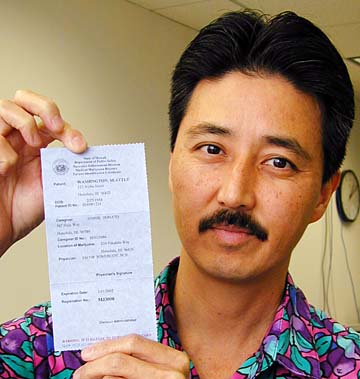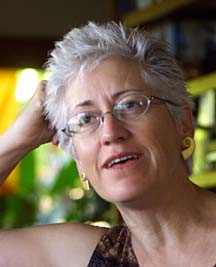
STAR-BULLETIN / 2001
Keith Kamita, the state Department of Public Safety's narcotics enforcement division chief, displays a medical marijuana certificate.
Medical marijuana:
Breathing uneasyDespite a Supreme Court ruling,
questions remain about the legality
of using pot as medicine
Celebration by patients and relief by some doctors followed the U.S. Supreme Court's decision last month clearing the way for physicians to recommend use of marijuana to patients in Hawaii and other states where medical marijuana has been legalized, but the legality remains hazy.
The number of patients registered to grow and use the plant in Hawaii has grown to 1,145 from 1,039 since the Supreme Court's Oct. 14 decision, according to Keith Kamita, the state's narcotics enforcement chief and registrar of the certification program in the state Department of Public Safety.
In that decision, the high court let stand a ruling by the 9th U.S. Circuit Court of Appeals, whose jurisdiction includes Hawaii, that physicians may recommend marijuana to their patients. Kamita said he believes the state's medical marijuana law complies with that ruling.
"We haven't had any contact with the (U.S.) attorney general (saying) that it does not," Kamita said.
Ed Kubo, the U.S. attorney for Hawaii, said the Justice Department "has a need to review and to analyze" the appellate court ruling. A "definitive decision or opinion" from the department could come in a few months, he said.
Pamela Lichty, president of the Drug Policy Forum of Hawaii, which supports the medical marijuana law, said the Supreme Court's rejection of the appeal was "a good non-decision" for the program, and thus for physicians recommending marijuana.
"It should allow them to relax somewhat," Lichty said. "Physicians' reluctance to participate has been one of the barriers to this program."
STAR-BULLETIN
"It should allow them to relax somewhat. Physicians' reluctance to participate has been one of the barriers to this program." --Pamela Lichty, President of the Drug Policy Forum of Hawaii, on the U.S. Supreme Court decision supporting doctors' right to recommend marijuana to patients
"It seems like everybody I've talked to is really excited and glad that it happened," said Terri Hurst, a University of Hawaii sociology graduate student who is researching the issue.
Thomas Mountain, who runs a cooperative of medical marijuana patients on Oahu, reports "an upsurge in activity" since the court's rejection of the government's appeal. However, Mountain is less than exuberant about the effect of the decision.
"It's still illegal federally even to possess marijuana," Mountain pointed out. "The law of the land still says -- the Supreme Court still says -- that, according to Congress, marijuana has no medical value.
"Even if I were to be arrested and tried in federal court in Hawaii," he said, "I could not raise that (medical use) in my defense. The judge would not even allow me to tell the jury that I am legal under the state of Hawaii laws."
Indeed, by an 8-0 vote, the Supreme Court ruled two years ago that a federal law classifying marijuana as an illegal drug carries no exception for ill patients. In that decision, the court ruled that California cannabis clubs may not legally distribute the drug as a "medical necessity" for the seriously ill.
In January, a federal jury in California convicted Ed Rosenthal, 58, a self-proclaimed "Guru of Ganja," for growing 100 marijuana plants in an Oakland, Calif., warehouse for patients approved by state health officials for medicinal use of marijuana. U.S. District Judge Charles R. Breyer had forbidden Rosenthal from citing that approval to the jury.
Angered that the mitigating information had been kept from them, some jurors called for a new trial. Breyer instead sentenced Rosenthal to one day in jail, rejecting prosecutors' recommendation that he be sent to prison for at least five years.
In the ruling that the Supreme Court let stand last month, the 9th Circuit said: "If, in making the recommendation, the physician intends for the patient to use it as the means for obtaining marijuana, as a prescription is used as a means for a patient to obtain a controlled substance, then a physician would be guilty of aiding and abetting the violation of federal law."
A doctor's "anticipation" that a patient "might" obtain marijuana does not amount to illegal conspiracy to violate federal law, the appeals court said. A conspiracy, it ruled, "would require that a doctor have knowledge that a patient intends to acquire marijuana, agree to help the patient acquire marijuana and intend to help the patient acquire marijuana," as a result of the recommendation.
"There's a lot of wiggle room for everybody," U.S. Attorney Kubo said of the wording, "and that's why the (Justice) Department needs to analyze the case a little more before we can come out with any statement with regard to that case or medical marijuana in general."
The Hawaii statute, enacted in 2000, allows patients to employ the recommendation to possess and use marijuana. It allows certified patients to possess three mature marijuana plants, four immature plants and as much as three ounces of marijuana, but they apparently are not allowed to obtain marijuana other than by growing it.
"The law is silent on that," Kamita says. It remains illegal in Hawaii for anyone to sell or buy marijuana. He says he believes a large majority of marijuana patients are growing their own.
That is not the impression of Hurst, who has been contacted by about 20 patients and has interviewed nine of them.
"Very few" are growing marijuana themselves, Hurst says. "The big thing is that they don't know how. It seems like the ones who have tried growing it, sometimes the plants get stolen if they grow them outdoors, and then sometimes the plants don't yield enough, because they were saying the plants cross-breed, and there's some kind of fungus that attacks it."
Mountain says most marijuana patients on neighbor islands may be growing it, but most patients in Honolulu are not.
"On Oahu, where can you grow it?" Mountain asks. "If you live in an apartment in Makiki, your landlord doesn't want you. They're going to chuck you out. They don't care if it's legal.
"Where do you get seeds? How do you grow it? You have to get lights. Can you put it on your balcony? In the middle of winter, the weather's bad for a month."
Mountain says the high court's refusal to review the 9th Circuit ruling "just took some of the heat off doctors. Some doctors aren't quite as afraid anymore. Most doctors are still terrified."
Not William B. Wenner, 77, a retired surgeon in Volcano, who estimates that he has recommended marijuana for more than 400 of the 591 certified patients on the Big Island.
"I'm home free now," Wenner told The New York Times after the high court's rejection of the 9th Circuit appeal. "Who's going to come and get me, and for what? I'm listening to these people and evaluating their complaints, and I've got three file drawers with their charts."
Without naming Wenner, who could not be reached for further comment, Kamita said the sheer volume of a Big Island physician's recommendations "draws questions. Are you adequately treating these patients?"
Lichty says she is confident that Wenner is acting responsibly in recommending marijuana to patients.
"I know Bill Wenner very well," Lichty said, "and I also know that he sees every one of those patients individually. He is very well aware of the politics of all this, and he is very careful.
"He looks at their medical records and he has a bona fide relationship with them," Lichty said of Wenner. "He's an addiction specialist as well as a surgeon, so he's not by any means a fly-by-night physician. He also has probably a better knowledge of the topic than any other doc in the state that I know of."
Marijuana is touted as effective in easing pain for sufferers of AIDS, cancer, multiple sclerosis and other illnesses. Kamita said he expected most physicians' recommendations to come from oncologists or other doctors specializing in treatment of those illnesses, but that has not been the case.
He said a bill in last year's Legislature would have required a doctor to physically examine a patient before recommending marijuana, but it died in committee. The current law allows a physician to simply examine the patient's records before certifying that he or she has a debilitating medical condition warranting the medical use of marijuana.
Mountain, whose Honolulu Medical Marijuana Patients Co-op has 60 to 70 members, said he refers patients only to "doctors who will treat patients not just for marijuana but treat them holistically for all their illnesses.
"It bothers me that doctors are abusing it," said Mountain, who smokes marijuana before bedtime to reduce pain and muscle spasms from a spinal cord injury.
"They're going to give grounds to attack the law, because they're not really being doctors. The intent of the law is to allow doctors who are treating patients to be able to recommend marijuana."
While concerned about such abuse, Mountain is leery about further legislation to prevent it.
"I don't want to open up this law," he said, "because who knows who's going to jump in and take it away from us. Right now, the law is set up so that by jumping through loopholes we can help people grow their own marijuana. I can sleep at night."

